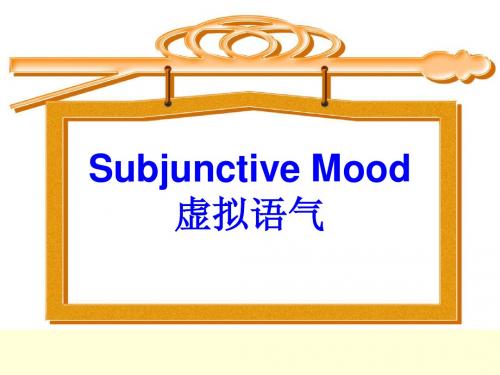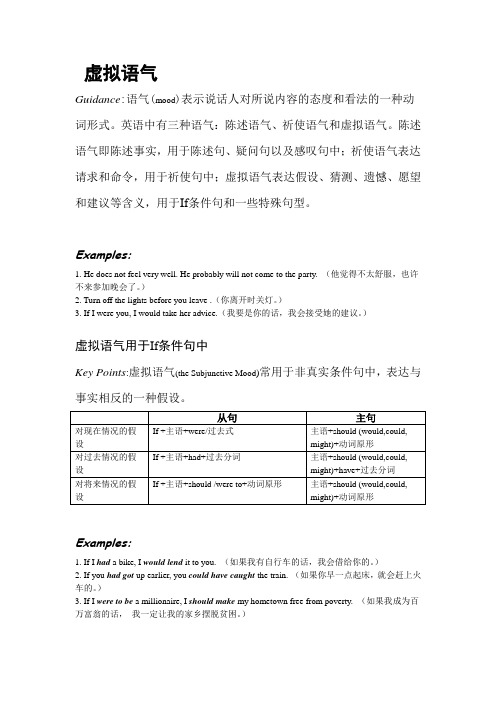英语的动词有三种语气形式
- 格式:pdf
- 大小:237.67 KB
- 文档页数:19


英语句子中谓语动词的语气有三种:1. 直陈语气(The Indicative Mood)直陈语气用于直截了当地陈述事实、描述状态:He has published quite a number of essays this year .他今年已发表了好几篇论文。
2. 祈使语气(The Imperative Mood)祈使语气用于提出请求、命令、建议或是劝告等:Wait outside until you are asked . 请在外面等候,请你进再进去。
Let's just take a break, shall we ? 我们休息一会儿,好吗?3. 虚拟语气(The Subjunctive Mood)虚拟语气用于表示主观愿望和假设的虚拟情况。
虚拟语气不太顾及事实的存在,它表现出说话人的主观因素比较多。
所以说话人所讲的内容往往是与事实相反的;或是其实现的可能性微乎其微,甚至于没有实现的可能性。
当然,有时为了使说话的语气客气、缓和、委婉,也使用虚拟语气。
例如:I wish you were more careful .但愿你更细心一些。
If I had more money, I would buy a bigger apartment.我要是有再多一点钱,我就买一套更大一些房子。
Would you mind shutting the door ? 劳驾您把门关上。
一、虚拟语气在条件状语从句中的构成和用法1. 表示一种与过去事实相反的假设情况,条件从句中的谓语动词要用“had+过去分词”,主句中的谓语动词要用“would / should / could / might+have+过去分词”。
如:If you had come here yesterday, you would have seen him. 如果你昨天来到这里,你就会看见他了。
2. 表示一种与目前事实相反的假设情况,条件状语从句中的谓语动词要用一般过去式(be动词常用were),而主句中的谓语动词则要用“would / should / could / might+动词原形”。

虚拟语气一、语气的分类语气概述:语气,跟失态和语态一样,也是动词的一种形式,表明说话者的意图、态度和目的。
英语中有三种语气:陈述语气、祈使语气和虚拟语气。
1.陈述语气:用来陈述事实或提出想法,包括肯定、否定例:Recent pressure at work may account for his behaviour.他的行为也许是最近的工作压力导致的。
2.祈使语气:表明说话人提出请求、命令或劝告等例:Calm down and tell me what happened.冷静点儿,告诉我发生了什么事。
祈使语气也可用在并列句中表示条件Work hard and you will succeed.好好干,你会成功的。
H e quick or you’ll be late.快点儿,否则你会迟到。
3.虚拟语气:表示说话人的一种愿望、建议、请求、命令;有时是一种非真实的假设,与事实不符或相反的情况例:If had seen him yesterday, I would have told him the news.我如果昨天见到他,就会把这个消息告诉他了。
二、虚拟语气的用法(一)虚拟语气在条件句中的应用1.虚拟语气主要用在虚拟条件中,表示根本不存在的情况或可能很小的假设虚拟语气用于if条件句中时,主句和从句谓语动词的形式如下:——与现在事实相反:过去式(be一般用were)should/ would/could/might+动词原形——与过去事实相反:had+过去分词should/ would/ could/ might have +过去分词——与将来事实相反:过去式(be一般用were)/should + 动词原形/ were to + 动词原形should/ would/ could/might + 动词原形例:If I had enough money, I would buy myself a computer.我如果有足够的钱,会为自己买一台电脑。

英语语气的用法大全语气及其种类1)语气(mood)语气是一种动词形式,表示讲话人对某一行为或事情的看法和态度。
2)语气的种类语气可分为下列三种:a)直陈语气(indicative mood)表示讲话人认为他所说的话是一个事实。
如:There are two sides to every question.每个问题都有两个方面。
Jinzhou is famous for its apples.锦州以产苹果闻名。
Comrade Zhang Side had a deep love for the Party.张思德同志对党怀有深厚的爱。
b)祈使语气(imperative mood)表示讲话人对对方的请求或命令。
如:Bring along your exercise books tomorrow.明天把练习本带来。
Make yourself at home.请随便,不要客气。
Don't move! 不许动!Don't be late.不要迟到。
Be quiet! 请安静!c) 虚拟语气 (subjunctive mood)。
虚拟语气 A虚拟语气虚拟语气是一种特殊的动词形式,用来表示说话人所说的话不是一个事实,而只是一种愿望、假设、怀疑、建议、猜测、可能或纯粹的空想等。
如:If I were not so busy,I would go with you.假如我不太忙,我会和你一起去。
(表示假设)I wish Lao Li were here.H6 would know how to fix the machine.老李在这儿就好了,他会知道怎样把机器修好的。
(表示愿望)He suggests that we should all go to see the film.他建议我们都去看电影。
(表示建议)虚拟语气的动词形式比较特殊,共有下列七种:1)动词原形(用于一切人称和数)2)动词的过去式(用于一切人称和数,be的过去式用were)3) had + 过去分词(用于一切人称和数)4) should + 动词原形(用于一切人称和数)5) should have + 过去分词(用于一切人称和数)6) should (第一人称),Would(第二、三人称) + 动词原形7) should(第一人称),Would(第二、三人称) + have + 过去分词[注]上述某些动词形式和直陈语气的某些动词形式相同,但它们的用法及其所表示的时间概念则完全两样,二者切不可混淆。

虚拟语气Guidance:语气(mood)表示说话人对所说内容的态度和看法的一种动词形式。
英语中有三种语气:陈述语气、祈使语气和虚拟语气。
陈述语气即陈述事实,用于陈述句、疑问句以及感叹句中;祈使语气表达请求和命令,用于祈使句中;虚拟语气表达假设、猜测、遗憾、愿望和建议等含义,用于If条件句和一些特殊句型。
Examples:1. He does not feel very well. He probably will not come to the party. (他觉得不太舒服,也许不来参加晚会了。
)2. Turn off the lights before you leave .(你离开时关灯。
)3. If I were you, I would take her advice.(我要是你的话,我会接受她的建议。
)虚拟语气用于If条件句中Key Points:虚拟语气(the Subjunctive Mood)常用于非真实条件句中,表达与事实相反的一种假设。
Examples:1. If I had a bike, I would lend it to you. (如果我有自行车的话,我会借给你的。
)2. If you had got up earlier, you could have caught the train. (如果你早一点起床,就会赶上火车的。
)3. If I were to be a millionaire, I should make my hometown free from poverty. (如果我成为百万富翁的话,我一定让我的家乡摆脱贫困。
)Practice:1. If I had a bike, I ______ it to you yesterday.A. lentB. had lentC. would lendD. would have lent正确答案:D2. We didn’t know his telephone number, otherwise we ______ him.A. would have telephonedB. must have telephonedC. would telephoneD. had telephoned 正确答案:AKey Points: 虚拟语气有时用于倒装句中表达强调,即条件句中省略if,动词were, had或should移到主语前面。

虚拟语气知识要点一、语气是动词的一种形式,它表示说话人对某一行为或事情的看法和态度。
英语中有三种语气:1.述语气:表示谓语动词表示的动作/状态符合客观现实。
2.祁使语气:表示号召、命令、建议、劝告、警告、禁止等。
3. 虚拟语气:表示动作/状态不是客观现实,而是愿望、假设、推测等。
二、虚拟语气的构成例:○与将来的事实相反:1.If Professor Li should have time tomorrow, wecould ask him some questions.2.If there should be no air, there would be no livingthings.3.If it wereto snow tomorrow, they couldn’t goout. ○与现在的事实相反:1. If it rained now, I wouldnotgo shopping.2. If I were a teacher, I wouldbe strict with my students.3. If it werenot for their help, we shouldbe in a verydifficult position.○与过去的事实相反:1. If I hadcome yesterday, I wouldhaveseen him.2. If we hadstarted earlier, we shouldnothavemissedthe train.3. If she hadn’tbeen ill, she mighthavecome.***请注意三种特殊情况:○上面的句子大多都可以改成倒装句,这时If就省略了,同学们要能识别出来。
如:1. Should there be no air, there wouldbe no living things.2. Were it not for their help, we shouldbe in a verydifficult position.3. Had she not been ill, she mighthavecome.○错综时间条件句。
一、概述语气是一种动词形式,是讲话人对说话内容的看法的语法范畴,英语中有三种语气,即陈述语气、祈使语气和虚拟语气。
二、语气的种类1、陈述语气(indicative mood)表示谓语动词所表达的动作或状态是符合客观事实的,也就是说把动作或状态当作事实表达出来。
There are two sides to every question. 每个问题都有两个方面。
She is a very good student. 她是一个很好的学生。
2、祈使语气(imperative mood)表示讲话人对对方的请求、命令号召、劝告、警告、禁止。
Don’t be late for class. 上课不要迟到。
Take a seat, please.请坐。
3、虚拟语气(subjunctive mood)是一种特殊的谓语动词形式,用来表示一种假设、愿望、建议、请求、命令、猜测、可能、空想等非真实情况。
How I wish I were a bird!我多么希望我是一只小鸟!I suggest you should go to have a walk.我建议你去散步。
三、虚拟语气在非真实条件从句中的用法非真实条件句所假设的是不可能有的条件,或者是与事实相反的条件,这又可以分为三种情况。
1、表示与现在事实相反If there were no subjunctive mood, English would be easier.拟语气,英语会容易学。
I'd come too if I had time to spare.我如果抽得出时间的话,我也愿意来。
(与现在事实相反)If everyone in the country knew first aid,many lives would be saved.如果每个国民都懂得怎样急救,那么就可以挽救许多人的生命了。
(与现在事实相反)If I were you, I should do it.如果我是你的话,我就要做这件事。
语法知识——虚拟语气1.语气及其种类语气是动词的一种形式,它表示动词的作用和说话人的意图和态度。
英语动词的语气分三种:陈述语气、祈使语气和虚拟语气。
陈述语气表示动作或状态是现实的、确定的或符合事实的。
祈使语气表示动作或状态是说话人的建议、请求、命令等。
虚拟语气表示动作或状态不是客观存在的事实,而是说话人的主观愿望、假设或推测等。
2.虚拟语气的形式虚拟语气有两种形式:be型虚拟语气和were型虚拟语气。
Be 型虚拟语气是指不管主语是什么人称,动词一律用原形;were型虚拟语气是指不管主语是什么人称,动词一律用were(即过去时)。
试比较:I hope you can go with us.(表示一种有可能实现的愿望)我希望你能同我们一起走。
I wish you could go with us.(表示一种完全不能实现的愿望)我希望你能同我们一起走。
虚拟语气的用法1.在非真实条件句中⑴表示与现在事实相反:if从句用过去时,主句用should / would / could / might加不定式。
如:If she had time,she would / could / might go with you.如果她有时间,她就会/能和你去。
⑵表示与过去事实相反:if从句用过去完成体,主句用should / would / could / might加不定式完成体。
如:If I had had the money last year,I should / would / could / might have bought a house.如果我去年有了这些钱,我就会/可能买一所房子了。
⑶表示未来实现可能性极小,if从句用should / were to,主句用should / would / could / might加不定式。
如:If there should be / were / were to be something wrong,they would / could / might let you know at once.如果出了什么事,他们会/可能马上告诉你。
英语的动词有三种语气形式,即陈述语气、和。
陈述语气用来说明事实或就事实提出询问,可用于陈述句、疑问句和某些感叹句中;祈使语气用于表示请求、命令、建议或警告等。
虚拟语气是谓语动词的一种特殊形式,用来表达假设、主观愿望、猜测、建议、可能或空想等非真实情况。
如: He is honest. 他很诚实。
(陈述语气) Don‘t be late next time. 下次别迟到。
(祈使语气) If I were you ,I would not go. 我要是你,我就不会去。
(虚拟语气) I wish I had a lot of money. 要是我有很多很多钱就好了。
(虚拟语气)第一类 虚拟语气在条件句中的用法: 条件句有真实条件句和虚拟条件句两种。
真实条件句所表示的假设是有可能发生的,此时主句不用虚拟语气;而虚拟条件句则表示一种假想,与事实相反或不大可能会发生,此时用虚拟语气。
如: If I have time,I will go. 假若我有时间,我就去。
(陈述语气)If I were you,I would go. 假若我是你,我就去。
(虚拟语气) If you tried again,you might succeed. 要是你再试一试,你可能会成功的。
(might表可能) If you tried again ,you could succeed. 要是你再试一试,你就能成功了。
(could表能力) 2、错综时间虚拟条件句即条件从句与主句所指时间不一致,如从句指过去,而主句即指的是现在或将来,此时应根据具体的语境情况,结合上面提到的三种基本类型对时态作相应的调整: If it had rained last night, the ground would be wet now. 要是昨晚下过雨的话,现在地面就会是湿的。
You would be much better now if you had taken my advice. 假若你当时听我的话,你现在就会好多了。
3、If虚拟条件句的否定(含蓄条件句)常考两个句型:If it weren’t for…和If it hadn’t been for…,其意为“若不是(有)” “要不是”。
如: If it weren’t for water, no plant could grow. 要是没有水植物就无法生长。
If it hadn’t been for your assistance ,we wouldn’t have succeeded. =But for your assistance ,we wouldn’t have succeeded. =Without your assistance ,we wouldn’t have succeeded. 4、If虚拟条件句的倒装形式,即把were, had, should置于句首。
例: Were I in school again (= If I were in school again), I would work harder. Had you asked me, I would have told you. (=If you had asked me,…)第二类 使用虚拟语气的常见结构或从句: 1.*wish与hope接宾语从句的区别在于:hope表示一般可以实现的希望,宾语从句用陈述语气。
wish表示很难或不大可能实现的希望,宾语从句用虚拟语气。
试比较: (1)We hope they will come. (We don’t know if they can come.) (2)We wish they could come. (We know they are not coming.) 2.if only 与I wish一样,也用于表示与事实相反的愿望,其后所虚拟语气的时态与wish后所接时态的情况相同: If only she had had more courage! 她再勇敢一些就好了。
If only I had listened to my parents! 我要是当时听了父母的话就好了。
If only she would go with me! 她要是愿意和我一道去就好了! *if only 通常独立使用,没有主句。
3.l would rather后句子用虚拟语气只分现在和过去 在would rather, would sooner, would just as soon后的that从句中, 句子谓语习惯上要用虚拟语气,表示"宁愿做什么" ,具体用法为: ① 一般过去时表示现在或将来的愿望 I’d rather you went tomorrow (now). 我宁愿你明天(现在)去。
② 用过去完成时表过去的愿望 I’d rather you hadn’t said it. 我真希望你没有这样说过。
4.l as if (though)从句用虚拟语气 以as if (as though)引导的或表语从句,有时用虚拟语气,则与wish用法相同,例: He acts as if he knew me. 他显得认识我似的。
They treat me as though I were a stranger. 他们待我如陌生人。
He talks as if he had been abroad. 他说起话来好像曾经出过国。
注:两点说明 (1) 从句所表示的内容若为事实或可能为事实,也可用陈述语气: It looks as if we’ll be late. 我们似乎要迟到了。
(2) 注意It isn’t as if…的翻译: It isn’t as if he were poor. 他不像穷的样子(或他又不穷)。
第三类 从句中should+动词原形,should可省略 1. 在lest ,for fear that( 以免) ,in case(以防)引导的中的虚拟语气 She walked quietly lest she (should)wake up her roommates. 她走得很轻以免吵醒她的室友。
2. 表应当做值得做一类动词后的宾语从句 建议advise, suggest, propose, recommend命令order, command 请求ask, demand, require, request指示direct 敦促urge提议move, vote 希望desire坚持insist 打算intend安排arrange 例如: I insisted that he (should)stay. 我坚持要他留下。
He urged that they go to Europe. 他敦促他们到去。
He suggested that we should leave early. 他建议我们早点动身。
He ordered that it (should)be sent back. 他命令把它送回去。
I ask that he leave. 我要求他走开。
He requires that I (should)appear. 他要求我出场。
I move that we accept the proposal. 我提议通过这项提案。
He arranged that I should go abroad. 他安排我去国外。
She desires that he do it. 她希望他做此事。
The general directed that the prisoners should be set free. 将军指示释放那些俘虏。
*suggest表“暗示”insist表“坚持认为”不用虚拟语气 比较: He insisted that I had read his letter. 他坚持说我看过他的信。
He insisted that I should read his letter. 他坚持要我看他的信。
He suggested that we (should) stay for dinner. 他建议我们留下吃饭。
I suggested that you had a secret understanding with him. 我觉得你与他心照不宣。
3. order,suggestion,idea,plan, proposal, advice, demand等名词后的表语从句或同位语从句 Our suggestion is that you(should)be the first to go.我们的建议是你应该第一个去。
4.*advice, agreement, command, decision, decree, demand, determination, indication, insistence, order, preference, proposal, request, requirement, stipulation, suggestion, idea, plan, order l “It is (was)+ 紧急重要-- 带感情色彩 上述demand/suggest等动词过去分词或 important,natural,strange ,necessary,surprised, appropriate等形容词后的主语从句 1. It is ordered that the army (should)get there by 4 a.m. 2. It is necessary that she (should) be sent there at once. 注:*It is necessary,important,strange,natural,advisable, anxious, compulsory, crucial, desirable, eager, essential, fitting, imperative(绝对必要), impossible, improper, obligatory, possible, preferable, probable, recommended, urgent, vital etc. ;it is a pity;It is requested/suggested/desired/proposed第四类 It’s time后的从句用虚拟语气 从句谓语通常用过去式表示(早)该干某事了 *有时也用过去进行时或“should+动词原形”(较少见,且should不能省略) ex. It’s time we went [were going, should go]. 我们该走了。